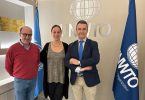Water scarcity is a problem that has affected mankind for decades. In recent years the situation has deteriorated further, with climate anomalies being recorded, global warming, record droughts and reservoirs falling to alarmingly low levels. The Massachusetts Institute of Technology (MIT) predicts that by 2025 the demand for fresh water is expected to grow by 50%, leaving one third of the world’s population without easy access to drinking water. By 2050 the world’s population is predicted to grow by a further two billion people, while the amount of water available will remain constant.
The time is right to pursue practical alternatives for obtaining drinking water and using water resources more intelligently in industrial processes and in daily life. In order to discuss these and other urgent topics, the city of Sao Paulo has been chosen to host the 2017 World Congress on Desalination and Water Reuse. This international event, held every two years, is coming to Latin America for the first time. The process of choosing a candidate city began in 2010, and Sao Paulo was chosen thanks to the efforts and tireless work of Sao Paulo Convention & Visitors Bureau (SPCVB), a not-for-profit private entity that aims to attract domestic and international events to the city.
To Emilio Gabbrielli, Vice-President of IDA, the International Desalination and Water Reuse Association, and Director of Business Development at Toray, a Japanese company that produces membranes used in desalination and reuse, the importance of these activities goes beyond the current water shortage. “Of course the drought that is currently affecting cities and states of Brazil will increase the importance of the Congress, but regardless of the crisis the overall demand for fresh water is so high that all possible sources ought to be taken into consideration, including desalination and reuse. This is an extremely urgent issue, because the amount of water available and the way it is used today can directly affect any country’s society and economy,” he states.
Such companies as Petrobras are already resorting to desalination and water reuse. This is crucial in making its activity sustainable because the company uses large amounts of water in its procedures. “Water reuse often goes unnoticed in people’s daily lives: for example, shopping malls use gray water from washbasins to water their plants,” says Gabbrielli.
Water-scarce regions in Brazil are already practicing desalination to produce drinking water: the dry sertao of the State of Ceará, for example, or the island of Fernando de Noronha, surrounded as it is by seawater. One major challenge to making desalination feasible is the cost of maintenance of the equipment. Gabbrielli, however, affirms this is just a myth.
“It is about having alternatives and analyzing which is the most feasible in each case. The cost of piping water to inland cities is greater today than that of the desalination process. For coastal cities or cities in drought-affected regions, the cost of desalination may be equal to, or cheaper than, that of the treatment of polluted water, headwaters, or of water from other basins,” says Gabbrielli, who adds, “Desalination and reuse cost no more than other treatments. Our Congress aims therefore to promote the debate and raise awareness of these processes as feasible alternatives. It will introduce new technologies, and research and studies in the field. It will also be an opportunity for Brazilian companies to show what they are already doing.”
Sao Paulo competed against two other cities to host the Congress: Kuwait (UAE) and Busan (South Korea). The World Congress on Desalination and Water Reuse will be held in the second half of 2017.
Pollutants identified in the Stockholm Convention to be debated
Brazil and 120 other countries signed the Stockholm Treaty in 2001, on the emission and treatment of Persistent Organic Pollutants (POPs), chemicals that remain for a long time in the environment and may affect living beings. Thanks to efforts undertaken since 2010 by SPCVB and the University of Sao Paulo’s Public Health School (FSP/USP), Sao Paulo has been chosen to stage DIOXIN 2015 (The 35th International Symposium On Halogenated Persistent Organic Pollutants), from August 23 to 28 at the Maksoud Plaza Hotel. Acqua Consultoria is responsible for the logistics of the event.
DIOXIN is an annual international encounter held since 1980, being staged for the first time in Latin America this year, and is supported by the Environmental Health Department of FSP/USP. “POPs, which may come from plant protection products, burned fuels, the incineration of garbage, insect control chemicals, and from the chemical industry as a whole, are harmful to the health of living things and move throughout the environment, affecting not only the places where they were released but also remoter regions. They remain in the environment for a long time,” states Professor Joao Vicente de Assunçao, Ph.D., who was Department Chief when the event was approved, and is former President of the Research Commission of FSP/USP. He adds that Brazil still lacks measurements of the levels of POP emissions and contamination.
“A range of processes like incineration and the use of plant protection products and pesticides expose the population at large to toxic substances of which they are unaware. This will be an important Symposium because Sao Paulo is just getting started in this field: there are small groups carrying out research, but the sector needs urgently to develop,” he affirms.
From 1975 to 1993 the city of Paulínia (Sao Paulo state) suffered one of the most infamous contamination incidents: the water table of the River Atibaia was contaminated by substances leaking from stored plant protection products. “The use of chlorinated pesticides has been banned in agriculture, so they are now stored, which may lead to contamination of the soil and of the population,” says Professor Joao Vicente.
The Symposium will address twelve basic issues relating to POPs, and mark the drafting of the National Plan to Implement the Stockholm Convention, a commitment that Brazil signed up to in 2004. “We need to bring the scientific community together, understand how pollutants behave in the environment, where they end up and their concentrations in the environment, their effects on health, how they affect sea creatures, and what they do to the Arctic and Antarctic ecosystems. The meeting will be essential because it will present measuring and detection devices; current research; and will be a unique opportunity for Latin America. Lecturers, researchers, environmental agencies and industry professionals will be able to learn what is being produced in this field,” concludes Professor Assunçao.
Sao Paulo, number one in Brazil
In 2016 Sao Paulo will also hold the International Symposium on Control of Contamination at the Rebouças Convention Center, from September 17 to 23. SPCVB is supporting the event, which will address the latest developments in contamination control in closed environments. These three events all present an ICCA (International Congress and Convention Association) profile. That means that they are international associational events with a pre-defined frequency, they rotate their venues and are attended by at least 50 people. Every year ICCA, the international agency responsible for managing the world’s largest database of events, publishes its ranking of the cities that host the most events.
Sao Paulo stood out as number one in Brazil in 2014, came third in the Americas, and ranked 34th in the world. There were also more than 22% of domestic ICCA-profile events, placing Brazil 10th on a world league table. “Brazil’s position, as well as those of other Brazilian and Latin American cities in the survey, shows how much cities are developing–both in their infrastructure to stage international events, and in the organization of information by Convention & Visitors Bureaus and other public tourism agencies. This shows how Sao Paulo has a natural calling to be a host city for associational international events, which are extremely important in the world of science and technology, and are responsible for disseminating developments, studies and research in a range of areas of knowledge. In the present case we are focusing on the environment at a critical moment for many places in Brazil and worldwide,” says Toni Sando, Executive President of SPCVB.






















